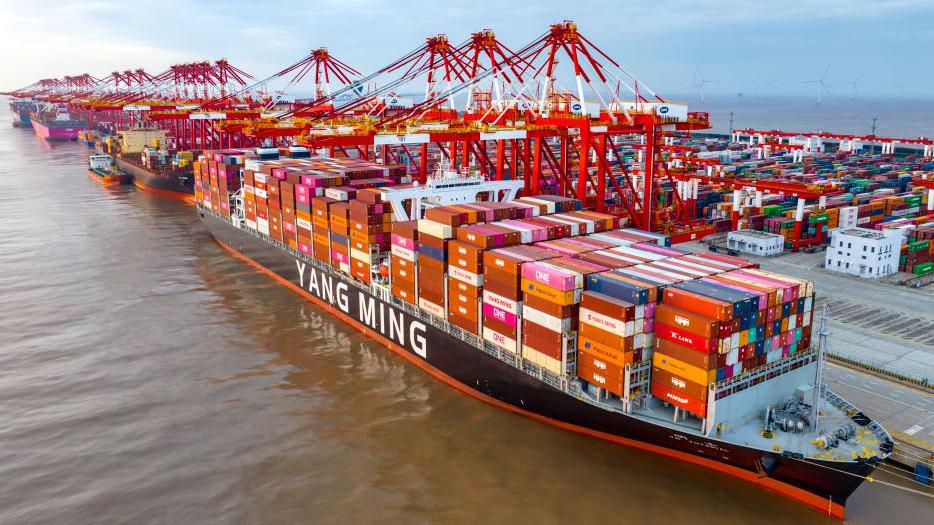The global economy in 2025 is poised for a challenging year, with projected growth at a “stable yet underwhelming” 3.2%, according to the International Monetary Fund (IMF). However, the policies of Donald Trump’s second term as US president could send shockwaves across markets. With inflation, interest rates, and the threat of new tariffs dominating headlines, experts warn of a precarious economic future shaped heavily by the former president’s return.
Here's ads banner inside a post
Interest Rate Cuts and Inflationary Woes
Just a week before Christmas 2024, American borrowers received an early gift: the Federal Reserve announced its third consecutive interest rate cut. However, markets tumbled as Federal Reserve Chair Jerome Powell cautioned against expecting further reductions anytime soon. “We’re going to be cautious about further cuts,” Powell emphasized, signaling an ongoing fight against inflation.
In November, inflation rose to 2.7% in the US, 2.6% in the UK, and 2.2% in the eurozone. While price increases have slowed compared to previous years, central banks are struggling to reach their 2% target, particularly as economic growth remains sluggish. Economists note that this “last mile” of inflation control is especially tough, further complicating the recovery process.
Tariffs: A Renewed Threat Under Trump
The return of Donald Trump to the presidency has rekindled fears of economic isolationism. His campaign promises of new tariffs on key trading partners like China, Canada, and Mexico are now becoming a reality. These protectionist measures, aimed at boosting US manufacturing, could have significant global repercussions.
Here's ads banner inside a post
Luis Oganes, head of global macro research at JP Morgan, warns: “The US is going into a more isolationist policy stance, raising tariffs. While it may support short-term US growth, it will hurt trade-dependent nations and potentially drag down the global economy.”
Maurice Obstfeld, former chief economist at the IMF, points out that industries such as car manufacturing, heavily reliant on cross-border supply chains, are particularly vulnerable. Disruptions in these industries could lead to higher prices, reduced demand, and weakened corporate profits. “Introducing these tariffs into a trade-dependent world could throw the global economy into recession,” Obstfeld cautions.
Impact on China and Europe
China, the world’s second-largest economy, is already grappling with domestic challenges, including weak consumer spending and business investment. The threat of new tariffs from Trump could exacerbate these issues, particularly as the nation’s economy depends heavily on exports of cheap goods. While the World Bank recently revised its growth forecast for China from 4.1% to 4.5%, President Xi Jinping acknowledged the “external challenges” facing the country.
Here's ads banner inside a post
In Europe, Trump’s protectionist stance is also causing alarm. European Central Bank President Christine Lagarde has warned that trade restrictions could further slow growth while contributing to inflation. Germany and France, traditionally the engines of the eurozone, are struggling with political instability and sluggish performance, making the continent particularly vulnerable to global economic disruptions.
Electric Vehicles: A Battleground for Trade Wars
One industry caught in the crossfire is electric vehicles (EVs). China’s dominance in EV production—10 million units in 2024 alone—has already prompted the US, Canada, and the EU to impose tariffs on Chinese imports. Beijing has challenged these measures at the World Trade Organization, but Trump’s return could lead to even harsher policies.
With the US aiming to protect its EV industry, further tariffs could intensify global trade tensions. Christine Lagarde noted that such measures “are not conducive to growth” and could have unpredictable inflationary effects. Despite efforts by companies to diversify supply chains, China remains an irreplaceable manufacturing hub for EVs and many other industries.
Wage Inflation and the Job Market
Beyond tariffs and trade wars, wage inflation remains a significant challenge. In the US, wage growth is projected to stay at 4% in 2025, with even higher rates in parts of Europe. Talent scarcity and inflationary pressures are driving businesses to pass these costs onto consumers, further fueling inflation.
According to Sander van ‘t Noordende, CEO of global recruitment firm Randstad, the global jobs market reflects a lack of economic dynamism. “If the economy is doing well, businesses grow, hire more, and create opportunities,” he explains. Without robust economic growth, labor markets may remain stagnant, compounding broader economic woes.
What Lies Ahead in Trump’s Second Term?
Trump’s economic policies, including potential tax cuts and deregulation, could boost the US economy in the short term. However, many fear his isolationist approach will strain global trade and exacerbate tensions with key partners like China, Mexico, and the EU. Luis Oganes from JP Morgan sums it up: “Everything points to continued US exceptionalism at the expense of the rest of the world.”
The global economy’s trajectory will largely depend on Trump’s policies and how other nations respond. For now, uncertainty reigns as the world braces for the return of “Trump 2.0” and its potentially seismic impact on international trade, growth, and stability.

